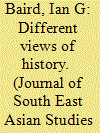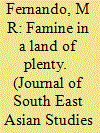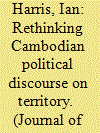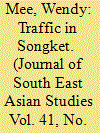| Srl | Item |
| 1 |
ID:
095562


|
|
|
|
|
| Publication |
2010.
|
| Summary/Abstract |
The administrative boundary between Laos and Cambodia is amongst the least studied international borders in Southeast Asia. Since Laos and Cambodia became independent in 1953-54, relatively minor but sustained tensions have characterised border relations. An important reason for disagreements is irredentist feelings. Some ethnic Lao in both Laos and Cambodia believe that part of northeastern Cambodia should be added to Laos, while some ethnic Khmer in Cambodia insist that their border should be extended to include part of southern Laos. Different emphases and framings of history have contributed to irredentism and the development of identities in relation to the border.
|
|
|
|
|
|
|
|
|
|
|
|
|
|
|
|
| 2 |
ID:
095564


|
|
|
|
|
| Publication |
2010.
|
| Summary/Abstract |
Cambodia has been governed by the same, relatively fixed, elite since the Vietnamese removal of the Khmer Rouge from power in early 1979. This article provides an analysis of the dynamic interplay of external and internal factors that have contributed to the perpetuation of this elite's rule in the context of a nominal political and economic transition that might have been expected to undermine the bases of their power. It is argued that the patrimonialism of the Cambodian state and the provision of material aid and political legitimacy by external actors have been central to the endurance of this ruling elite.
|
|
|
|
|
|
|
|
|
|
|
|
|
|
|
|
| 3 |
ID:
095566


|
|
|
|
|
| Publication |
2010.
|
| Summary/Abstract |
This paper is an effort to examine the dynamics of a major famine in the private domains of Indramayu and Kandanghaur in 1883-84, which was reportedly a result of drought, but a closer look at the evidence, including a unique survey of peasant families engulfed in the famine, reveals a rather complex situation. The local peasantry confined to a narrow subsistence economy found its food supply being seriously undermined by the landlords' efforts to extract more and more rice for sale at a time when Java was being closely drawn into the world market.
|
|
|
|
|
|
|
|
|
|
|
|
|
|
|
|
| 4 |
ID:
095563


|
|
|
|
|
| Publication |
2010.
|
| Summary/Abstract |
Despite their profound differences all of Cambodia's post-independence regimes have exhibited a unique obsession with protecting the country's borders from the depredations of neighbouring states. Some of this is fall-out from the colonial inheritance but this paper argues that older indigenous categories related to Theravada Buddhism have also played a significant role in the aetiology of modern Khmer territorialism. By showing how the traditional ma??ala arrangement of space was being eroded at around the same time as the old monastic conception of a ritual boundary was purified, rationalised and extended under the influence of Buddhism modernism the author seeks to provide a Southeast Asian illustration of Carl Schmitt's insight that certain important elements of the modern state are, in fact, secularised religious concepts.
|
|
|
|
|
|
|
|
|
|
|
|
|
|
|
|
| 5 |
ID:
095565


|
|
|
|
|
| Publication |
2010.
|
| Summary/Abstract |
This paper is ethnographically concerned with two different orang asli communities: the Meniq living in Southern Thailand and the Orang Sakai in Riau, Indonesia. The focus is on the different discursive rhetorics of development in the two nation-states. These rhetorics have been absorbed by the two indigenous groups to form part of their own modern cultural discourses within their respective countries. These rhetorics of development define the indigenous groups as somewhat lacking in culture and provide them with new understandings of themselves that devalue their customary way of life. The post-development indigenous identity work (such as the development of an ethno-cultural identity) will therefore usually be constructed through these negated developmental foundations.
|
|
|
|
|
|
|
|
|
|
|
|
|
|
|
|
| 6 |
ID:
095567


|
|
|
|
|
| Publication |
2010.
|
| Summary/Abstract |
This paper uses the example of songket to explore translocal Malay cultural processes in Sambas, West Kalimantan. I argue these intra-Malay cultural exchanges reframe selected Sambas Malay cultural forms as Malay 'cultural heritage', making it difficult to view cultural practices in purely localised terms. Consequently, many cultural forms lose their localised normative values and become aspects of a wider cultural heritage to be preserved, performed and consumed. The paper begins with a discussion of the historical, political and social grounds that forge a sense of translocalism amongst many Sambas Malays. Building on this, the more specific interest in participating in intra-regional Malay cultural exchanges is explained with reference to commodification, internationalisation and institutionalisation.
|
|
|
|
|
|
|
|
|
|
|
|
|
|
|
|